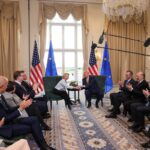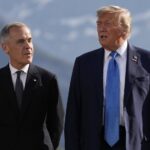In a rare moment of cross-partisan alignment, former Conservative Prime Minister Stephen Harper and potential Liberal leadership contender Mark Carney have converged on a critical economic strategy: Canada must rapidly diversify its international trade relationships beyond its traditional dependence on the United States.
The synchronized message from two of Canada’s most influential economic voices comes at a precarious moment for our nation’s trade policy. As protectionist sentiments resurge in American politics ahead of November’s presidential election, both Harper and Carney are signaling that Canada’s economic sovereignty requires immediate action.
“The United States is becoming more protectionist regardless of who wins the next election,” Harper warned during a recent economic forum in Toronto. “Canada needs to prepare for increased trade barriers with our largest partner by aggressively pursuing alternative markets.”
This assessment aligns surprisingly well with Carney’s position. The former Bank of Canada and Bank of England governor, widely rumored to be positioning for Liberal Party leadership, emphasized at a separate business conference that “diversification isn’t just good policy—it’s an economic imperative for Canada’s future prosperity.”
Their convergent viewpoints highlight an uncomfortable reality: Canada’s economy remains perilously tethered to American market access. Despite numerous free trade agreements negotiated over the past decade, approximately 75% of Canadian exports still flow south of the border, creating what economists describe as dangerous economic exposure.
Trade experts point to specific sectors where diversification efforts could yield immediate results. “Advanced manufacturing, clean energy technology, agricultural products, and professional services all represent areas where Canadian businesses could rapidly expand market share in Europe and the Indo-Pacific region,” explains Dr. Melissa Chen, international trade specialist at the University of Toronto.
The Harper-Carney consensus also reflects growing concern about the potential return of Trump-era trade tactics. During his administration, steel and aluminum tariffs significantly disrupted Canadian industries, with the threat of auto tariffs creating prolonged economic uncertainty.
“What’s notable here isn’t just the message but the messengers,” notes political analyst James Morrison. “When figures representing opposite ends of Canada’s political spectrum arrive at identical policy prescriptions, it suggests the gravity of the situation transcends partisan politics.”
Current trade diversification efforts under the Trudeau government have yielded mixed results. While agreements like CETA with the European Union and CPTPP in the Pacific region have opened new opportunities, Canadian businesses have been slow to fully capitalize on these pathways, with export growth to these regions remaining modest.
Business leaders acknowledge the challenge requires both government action and private sector initiative. “Developing new international business relationships takes significant investment and patience,” says Catherine Williams, CEO of the Canadian Export Association. “Companies need more targeted support to navigate unfamiliar regulatory environments and cultural business practices.”
As global trade patterns continue shifting amid rising geopolitical tensions, the Harper-Carney perspective raises a crucial question for Canada’s economic future: Can we transform our trade relationships quickly enough to protect prosperity if our American market access becomes increasingly restricted?

























